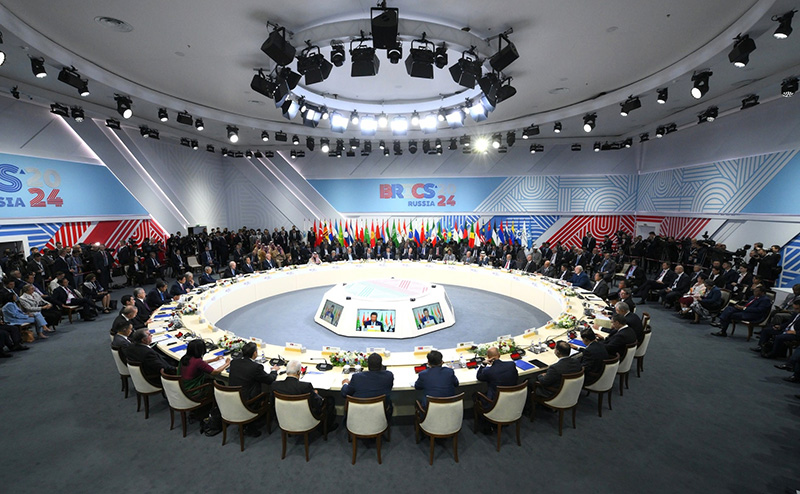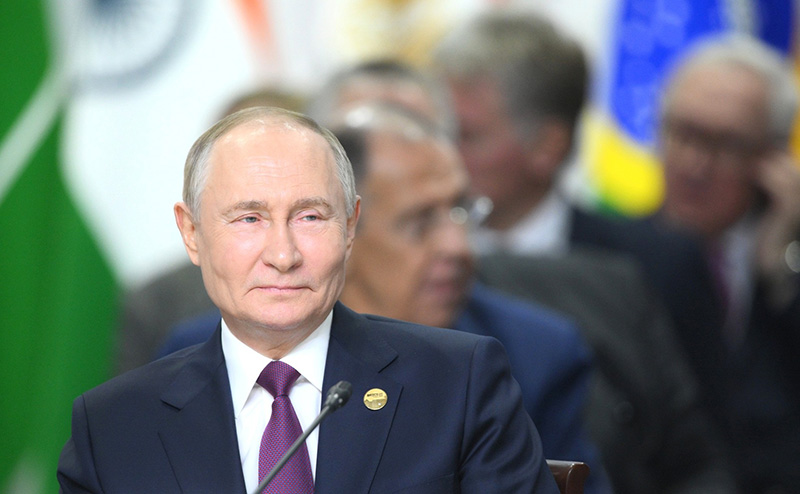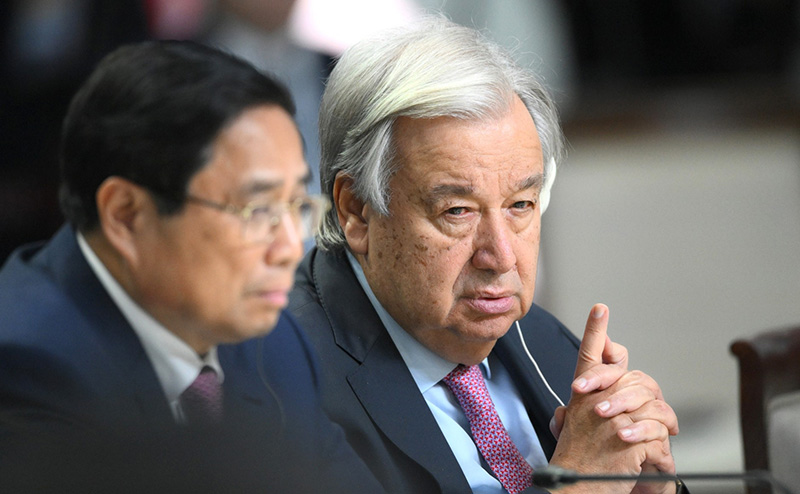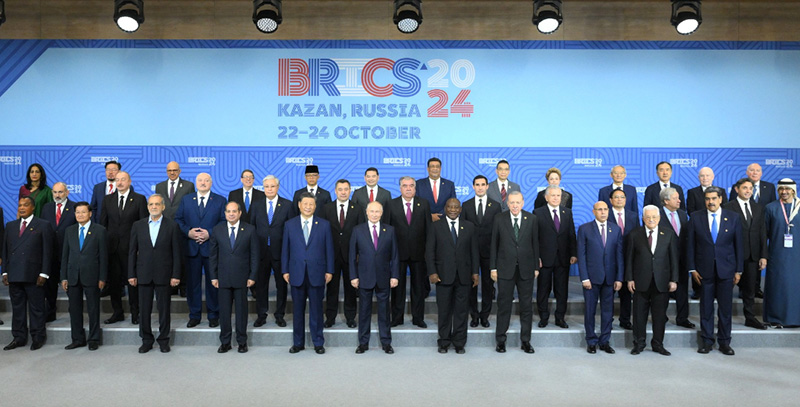 Photo: Kremlin.ru
Photo: Kremlin.ru
The capital of Tatarstan hosted a plenary session of the 16th BRICS Summit in the BRICS Plus/Outreach format, bringing together leaders from CIS countries, delegations for Asian, African, Middle Eastern and Latin American countries, as well as several international organisations at the level of heads of their executive bodies. October 24, 2024
Attending the meeting on the Russian side were Foreign Minister Sergei Lavrov, Deputy Prime Minister Alexei Overchuk, Deputy Chief of Staff of the Presidential Executive Office, Special Presidential Representative for Financial and Economic Cooperation with BRICS States and Interaction with the New Development Bank Maxim Oreshkin, Deputy Chief of Staff of the Presidential Executive Office – Presidential Press Secretary Dmitry Peskov, Presidential Aide Yury Ushakov, Head of the Republic of Tatarstan Rustam Minnikhanov, Deputy Foreign Minister, Russia’s BRICS Sherpa Sergei Ryabkov, and Ambassador at Large of Russia’s Foreign Ministry, Russia’s BRICS Sous-Sherpa Pavel Knyazev.
 Photo: Kremlin.ru
Photo: Kremlin.ru
President of Russia Vladimir Putin:
“Heads of state,
Ladies and gentlemen, friends,
I am delighted to welcome all of you to the BRICS Plus/Outreach-format meeting. This inclusive platform has proven its worth by enabling the BRICS group participants to engage in a direct and open dialogue with their friends and partners.
Let me remind you that heads of many African countries and senior executives from the key regional organisations were invited to attend last year’s meeting in Johannesburg. This time, the Russian chairmanship invited Russia’s closest neighbours and friendly countries with whom we share a common past, having lived within a single state. In addition, heads of state seeking to forge closer partnership ties with BRICS or even considering joining the group are also present here. There are also countries leading major multilateral structures here. Therefore, Europe, Asia, Africa and Latin America are all represented at this table.
According to our agenda, we will discuss the most pressing issues the international community is facing today, including sustainable development, eradication of poverty, climate change adaptation, exchanging technology and knowledge, fighting terrorism and transborder crime.
We will focus particularly on the peaceful resolution of conflicts, certainly including a serious discussion of the deteriorating situation in the Middle East.
It is crucial for BRICS members to discuss all these issues with countries from the Global South and East that share our approach. All our countries share similar aspirations, values and a vision of a new democratic world order that reflects cultural and civilisational diversity. We are confident that such a system should be guided by the universal principles of respect for the legitimate interests and sovereign choice of nations, respect for international law and a spirit of mutually beneficial, honest co-operation.
The transition to a more just international system is not easy. Its development is being hampered by forces whose thinking and actions continue to be aimed at dominating everything and everyone. Under the guise of a rule-based order they are imposing on the world, they are actually attempting to contain growing competition and prevent the independent development of countries in Africa, Asia and Latin America that they cannot control.
These forces are resorting to illegal unilateral sanctions, blatant protectionism, manipulation of currency and stock markets, and relentless foreign influence ostensibly promoting democracy, human rights, and the climate change agenda. Yes, they are using these tactics as well.
These twisted methods and perverse approaches – to put it bluntly – lead to the emergence of new conflicts and the aggravation of old disagreements. This undermines regional and global strategic stability, violates the principles of equal and indivisible security, and encourages internecine strife.
One example of this is Ukraine, which is being used to create critical threats to Russia’s security, while ignoring our vital interests, our just concerns, and the infringement of the rights of Russian-speaking people. Now they are not even hiding that their goal is to inflict a strategic defeat on our country. I will say bluntly that anyone harbouring such illusory plans has no understanding of Russia’s history, of our nation’s unity and cohesion forged over centuries, or our people’s moral fibre and fortitude.
But, as agreed, our discussion will primarily focus on the situation in the Middle East. This is another cause for concern, and precisely the case I was referring to: the escalation of a long-standing conflict that has not been extinguished for decades.
The current round of the Palestinian-Israeli confrontation is probably one of the most sanguinary in the long list of conflicts. Over 40,000 people, most of them civilians, have been killed in the ongoing hostilities in the Gaza Strip. I would like to emphasise that we have always come out against the use of terrorist methods.
The hostilities that began in Gaza a year ago have now spread to Lebanon. Other countries of the region have been affected as well. Tensions between Israel and Iran have increased dramatically. Taken together, this looks like a chain reaction that could push the Middle East towards an all-out war.
The humanitarian situation is rapidly worsening. The number of refugees and internally displaced persons has exceeded 1.5 million. Massive damage has been caused to infrastructure, apartment buildings, schools, hospitals and social facilities, and destruction is ongoing.
Russia has many problems of its own, of course, which are very important and which we must address, we are addressing them and will continue to do so. At the same time, we have always tried to make a substantial contribution to stabilisation in the Middle East. That is why, since the start of the escalation, we have joined forces with our BRICS and other partners to contribute to a settlement. As you may remember, our group even held a video summit in November 2023.
The immediate task is, of course, to launch a comprehensive political process for addressing the Middle East problem in its entirety. Violence must stop, vital assistance must be provided to the affected people, and their suffering must be alleviated. A settlement must be achieved on the basis of universally recognised international law, which actually stipulates the establishment of an independent Palestinian State that will live peacefully side by side with Israel.
Mending the historical injustice done to the Palestinian people would guarantee peace in the Middle East. The vicious circle of violence will not be broken until this problem is solved. People will continue to live in an atmosphere of permanent crisis, with inevitable outbreaks of massive violence.
I would like to repeat that the main condition for restoring peace and stability in the Palestinian territories is the realisation of the two-state formula approved by the UN Security Council and General Assembly resolutions.
As for the way we assess the present-day international environment, I would like to emphasise that the countries represented in this room have immense opportunities and resources at their disposal and play a prominent role on the international stage. In fact, they have been using their standing to enhance global security and promote sustainable development around the world.
In this context, many countries among us have put forward initiatives that have proven to be quite useful. Russia advocated the idea of creating an inclusive system of equitable and indivisible security for Eurasia free from any discrimination. This initiative consists of working together to guarantee genuine and reliable stability and enable all states and nations across the continent to develop themselves in peace.
Of course, the fact that this meeting is taking place on United Nations Day is a very powerful symbol. It was on October 24, 1945, that the UN Charter came into effect. It sets forth the principles which have served as the cornerstone of interstate relations and international law for almost 80 years now.
The United Nations must retain its central role in efforts to maintain peace and security and facilitate sustainable and steady development. Meanwhile, to ensure the effective functioning of the UN in the future, we believe it is important to adapt its structures to the realities of the 21st century, expanding the representation of countries of Asia, Africa and Latin America, including those whose leaders are present here, in the Security Council and other key international bodies.
An effort to reform UN development institutions and global financial structures has long been overdue. Developing countries no longer play the role they used to have within the global economy. Everything changed over the past decades. However, this did not pave the way to any changes or shifts in the management of the International Monetary Fund, the World Bank or other multilateral development banks.
The founding fathers of the United Nations believed that its purpose was to enable nations to come together and agree on joint actions. In fact, it is only by working together that we can respond to global challenges and threats and deal with issues such as terrorism, drug trafficking, corruption, organised crime, including the criminal use of information technology, and of course foster steady economic growth for inclusive development and prosperity.
It is quite clear that the countries of the Global Majority will be the ones to bring about the next wave of global economic growth. Therefore, it is high time that we discuss the idea of setting up our own platform for unlocking the potential of our emerging economies. It must enable countries from the BRICS group, as well as those across the Global South and East, to attract more investment and focus on investing in infrastructure and technology projects.
It is essential to build alternative multilateral financial mechanisms and supply chains that are reliable and free from any dictate, to establish channels for exchanging advanced technology and expertise, to develop new international transport corridors and increase their capacity.
Russia is working together with its partners to enhance globally significant routes such as the North-South corridor and the Northern Sea Route, and we invite all interested countries to participate.
As we are well aware, climate has a special place in the sustainable development agenda. In this regard, it makes sense to focus on developing practical solutions to the problems caused by global warming. It is important to provide countries in the Global South and East with access to financing and technology, and to help them adapt to climate change.
I would like to emphasise that Russia seeks to participate in the global climate process in the most active way possible. Our country is one of the leaders in terms of its contribution to reducing greenhouse gas emissions, and its energy balance is one of the greenest in the world. The cumulative share of environmentally friendly gas, nuclear and hydro generation in Russia is 85 percent. Russia accounts for more than 20 percent of the world’s forests, which help to slow global warming by absorbing greenhouse gases.
Russia also makes a serious contribution to global food and energy security. Last year alone, we exported over 100 million tonnes of agricultural products, becoming a leading grain exporter. Russia also holds a leading position in the energy market.
We have initiated the creation of a grain exchange within the BRICS format. We believe that this mechanism will facilitate the establishment of a transparent and risk-free regime for trade in agricultural products, both among BRICS countries and with our other partners.
In conclusion, I would like to reiterate that Russia, like all BRICS countries, is open to cooperation with all countries of the Global South and East to promote inclusive and sustainable development and ultimately build a better world. It will be a world where every nation’s stance and interests are taken into account, their right to sovereign development and their identity are respected, and the absolute value of all cultures, traditions and religions is recognised.
I trust that today’s discussion will be constructive and substantive and provide insights for addressing the current regional and global agenda.
Thank you for your attention.”
 Secretary-General of the United Nations Antonio Guterres.
Secretary-General of the United Nations Antonio Guterres.
Photo: Kremlin.ru
Vladimir Putin:
“Mr Secretary-General [of the United Nations Antonio Guterres] said that we all must live as one big family.
Mr Secretary-General, this is exactly the way we have been living our lives. Unfortunately, families often have quarrels and scandals and may have to split their assets, and sometimes their disputes become physical. BRICS sees its purpose as creating the necessary cooperation mechanisms and a favourable environment within the household we share. This is what we are doing, and this is what we will continue to do, including by working closely with the United Nations.
Thank you very much.
Colleagues, friends,
We will have a short break before continuing our work in the working breakfast format.
Thank you.”
 Photo: Kremlin.ru
Photo: Kremlin.ru
read more in our Telegram-channel https://t.me/The_International_Affairs

 17:50 24.10.2024 •
17:50 24.10.2024 •






















